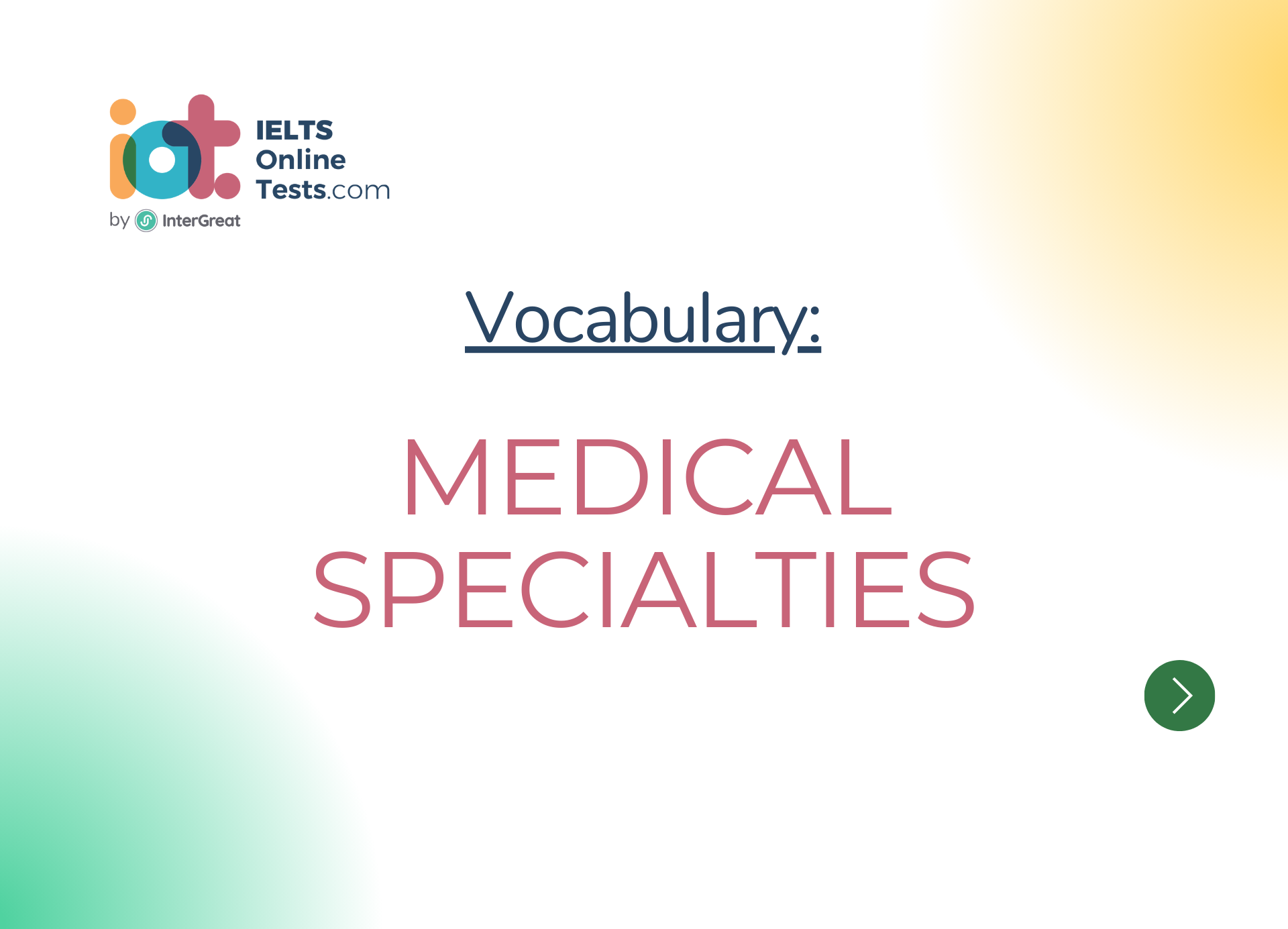
Medical specialties
Below is a detailed list of medical specialties along with their definitions. Familiarizing yourself with these medical terms can help you communicate effectively about different areas of medical practice, which can contribute to a higher band score in the IELTS exam.
Cardiology:
Definition: The medical specialty that focuses on the study and treatment of heart diseases and cardiovascular disorders.
Example: The patient was referred to a cardiologist for further evaluation of his heart condition.
Dermatology:
Definition: The medical specialty dealing with the diagnosis and treatment of skin disorders and diseases.
Example: The dermatologist prescribed a topical cream to treat the patient's eczema.
Neurology:
Definition: The branch of medicine that deals with disorders of the nervous system, including the brain, spinal cord, and nerves.
Example: The neurologist ordered an MRI to investigate the cause of the patient's frequent headaches.
Oncology:
Definition: The study and treatment of cancer, including the diagnosis, staging, and management of cancer patients.
Example: The oncologist recommended chemotherapy as part of the cancer treatment plan.
Pediatrics:
Definition: The branch of medicine that focuses on the health and medical care of infants, children, and adolescents.
Example: The pediatrician conducts routine check-ups and vaccinations for young patients.
Orthopedics:
Definition: The medical specialty dealing with the diagnosis and treatment of musculoskeletal disorders and injuries.
Example: The orthopedic surgeon performed a knee replacement surgery for the patient with severe arthritis.
Gynecology:
Definition: The branch of medicine that specializes in the female reproductive system and women's health.
Example: The gynecologist conducts regular screenings for cervical cancer and other gynecological conditions.
Ophthalmology:
Definition: The medical specialty concerned with the diagnosis and treatment of eye diseases and vision problems.
Example: The ophthalmologist prescribed glasses to correct the patient's nearsightedness.
Psychiatry:
Definition: The medical specialty that deals with the diagnosis and treatment of mental illnesses and disorders.
Example: The psychiatrist prescribed medication to manage the patient's anxiety.
Gastroenterology:
Definition: The branch of medicine that focuses on the digestive system and its disorders.
Example: The gastroenterologist performed an endoscopy to examine the patient's stomach and intestines.
Endocrinology:
Definition: The medical specialty concerned with the endocrine system and hormonal imbalances.
Example: The endocrinologist diagnosed the patient with a thyroid disorder.
Nephrology:
Definition: The branch of medicine dealing with the study and treatment of kidney diseases.
Example: The nephrologist recommended dietary changes to manage the patient's kidney stones.
Pulmonology:
Definition: The medical specialty that focuses on the diagnosis and treatment of lung and respiratory disorders.
Example: The pulmonologist ordered a pulmonary function test to assess the patient's lung capacity.
Rheumatology:
Definition: The branch of medicine dealing with the study and treatment of rheumatic diseases affecting joints and connective tissues.
Example: The rheumatologist prescribed medication to alleviate the patient's arthritis symptoms.
Hematology:
Definition: The medical specialty concerned with the study and treatment of blood-related disorders and diseases.
Example: The hematologist conducted blood tests to diagnose the patient's anemia.
Otolaryngology:
Definition: The medical specialty dealing with disorders of the ear, nose, and throat (ENT).
Example: The otolaryngologist performed a tonsillectomy to address the patient's recurrent throat infections.
Urology:
Definition: The branch of medicine that focuses on the diagnosis and treatment of urinary system disorders and male reproductive system conditions.
Example: The urologist performed a prostate examination to screen for prostate cancer.
Emergency Medicine:
Definition: The medical specialty concerned with providing immediate care for acute medical conditions and emergencies.
Example: The emergency medicine physician treated the patient's severe allergic reaction.
Infectious Diseases:
Definition: The medical specialty that deals with the study and treatment of infectious diseases caused by bacteria, viruses, and other pathogens.
Example: The infectious disease specialist prescribed antibiotics to treat the patient's bacterial infection.
Geriatrics:
Definition: The branch of medicine focusing on the health and medical care of elderly patients.
Example: The geriatrician assessed the patient's cognitive function and recommended appropriate care for age-related conditions.
Please note that this list is not exhaustive, as there are many other specialized fields within medicine. Understanding these medical specialties and their associated vocabulary can help you communicate effectively about different areas of healthcare during the IELTS exam or any medical-related discussions.




